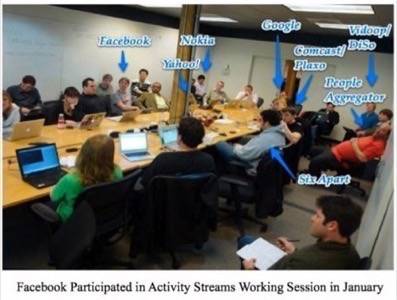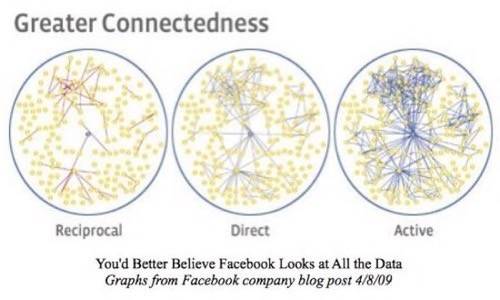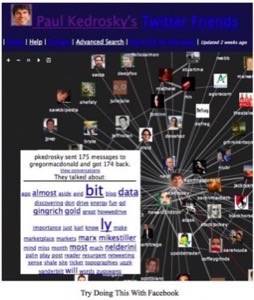What are people saying on Facebook about the swine flu? Facebook knows, but they won’t tell you. The company made a major move today to open up some of the data on the site in some interesting ways – but the conversation on Facebook remains fundamentally closed due to extensive privacy limitations and the company’s disinterest in overcoming those limitations in an appropriate way.

Ask Twitter what people are saying on that site about the swine flu and you can get the full story to parse until you’re blue in the face. The new Facebook openness is like interoperability between different telephone handset manufacturers but conversation remains closed between individuals. Conversation on Facebook is no more easy to analyze today than it was yesterday; that’s the real opportunity here, not just the ability to send and receive Facebook messages through different applications.
It’s a networked world and we should be able to have our cake and eat it too in terms of secure conversation and network effects anonymously analyzed in aggregate.
The Good News
Facebook users will now be able to send and recieve all kinds of data through other websites and applications. Think Tweetdeck both reading from and writing to Facebook. It is good news that Facebook has decided to implement the work it’s been participating in with the Activity Streams working group.

This should enable Facebook messaging through different interfaces to suit different users’ needs and desires. It should help cut back on user criticism about UI changes to the site – there will now be different services that serve up the data in different ways – take your pick.
Facebook told us today that every field displayed in the Facebook Newsfeed will be made available through the Activity Streams API, for example, content, username, timestamp, and source if we’re talking about something pulled in from offsite. Facebook’s, David Swain, told us he expects to “see a lot of innovation on top of the stream. We expect developers to filter it, remix it, and serve it up in new and interesting ways.”
The Not So Good News
Unfortunately, the data that developers are able to work with is severely limited. They will simply be able to make a call for a user to Facebook and get back the friends’ streams that this particular user has the permission to see. The data can’t be cached for later analysis, the company isn’t sure yet how far back in the archives access will be permitted (though they say the goal is to expose all the way back), and the Terms of Service will prohibit eyes outside of a user’s Facebook friends from seeing the massive amounts of friend-limited data.
In other words, this is permission to build more interfaces for Facebook. That’s cool, but that’s not really what the world needs – more interfaces for giving Facebook love.
Facebook holds a mind-blowing amount of conversational data. The company is analyzing it extensively and it has an omniscient view of conversations across all the networks of friends and privacy restrictions. It uses that aggregate data analysis to make business decisions and to sell advertisements.

The rest of us are only allowed to give Facebook more data and to get back a sliver per user that will facilitate more user-level participation in amassing more data at Facebook.
The most common analogy used when standards are discussed is the railroads. When railroads agreed to use the same width of rail, then trains could travel from network to network and transcontinental transport became possible. Today’s announcement by Facebook is something like that, and that’s great. But imagine the analytic value that could be drawn from getting reports about train times and rail conditions across the line. That’s the kind of data that allows for more intelligent and interesting decisions to be made. That’s explicitly prohibited, in this case, by Facebook.
How is global climate change being dealt with? It’s being dealt with through global sharing of data for analysis. How is science being advanced? In some of the most exciting cases, it’s being advanced by public sharing of huge data stores that anyone can then analyze for patterns. What’s been some of the most important data in the United States over the last few centuries? It’s census data that has been made publicly available in anonymous aggregate but in a format that could be cross-referenced with geography, commercial, and other data to better understand the world we live in.
The data that Facebook controls, conversations and social connections, could be used for analysis of real-time social patterns which could lead to world-shaking new insights. Do we get access to that data? No.
Why not? We don’t get that access because Facebook was built on a fundamental promise of privacy and a complex system of privacy controls. Privacy is good, it’s very good. But, the census gathers and exposes personal data without violating privacy. Lots of systems do.
Facebook needs to too. The data the network controls is just too valuable to keep locked up for only the company’s own analysis.

Facebook’s David Swain says that privacy on Facebook is evolving and the company is interested in facilitating this kind of analysis, but that Facebook is “not hearing users clamor for interesting analysis.” That’s a disingenuous argument coming from a company that is famous for pushing through important technologies against the wishes of its users, much less without their request.
The era of user-published content is still catching up to millions of people, but innovation is fast moving beyond that point. In order to deal with pressing global problems and truly leverage what’s possible with contemporary internet technology, we need data-centric hooks extended for developers to grab hold of and build the future. Facebook is one of the biggest stores of data that innovation could be built upon. Once that kind of openness is achieved, then we’ll say that Facebook is truly opening.










